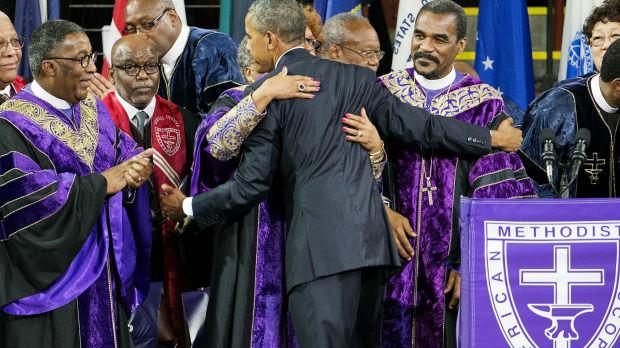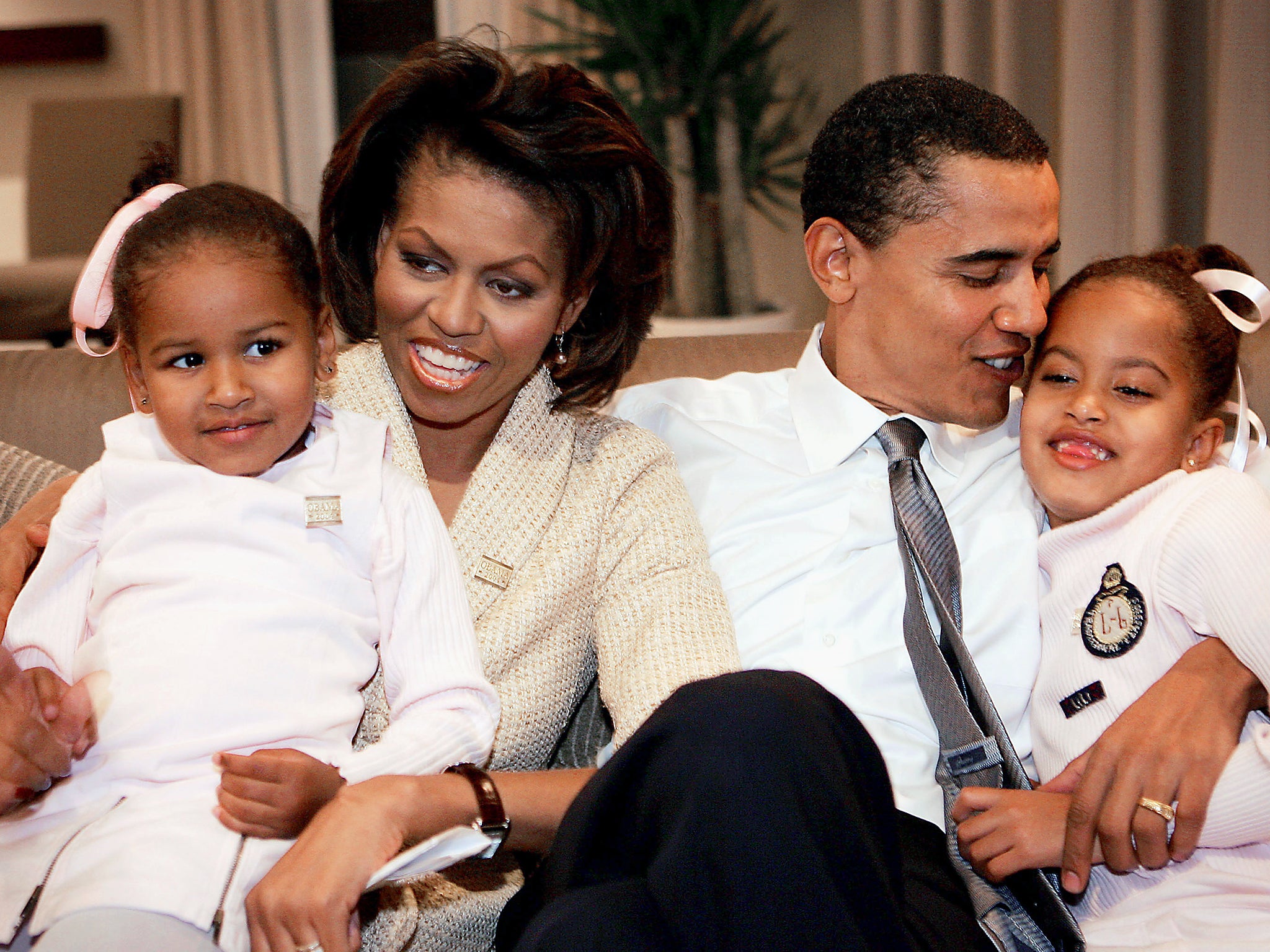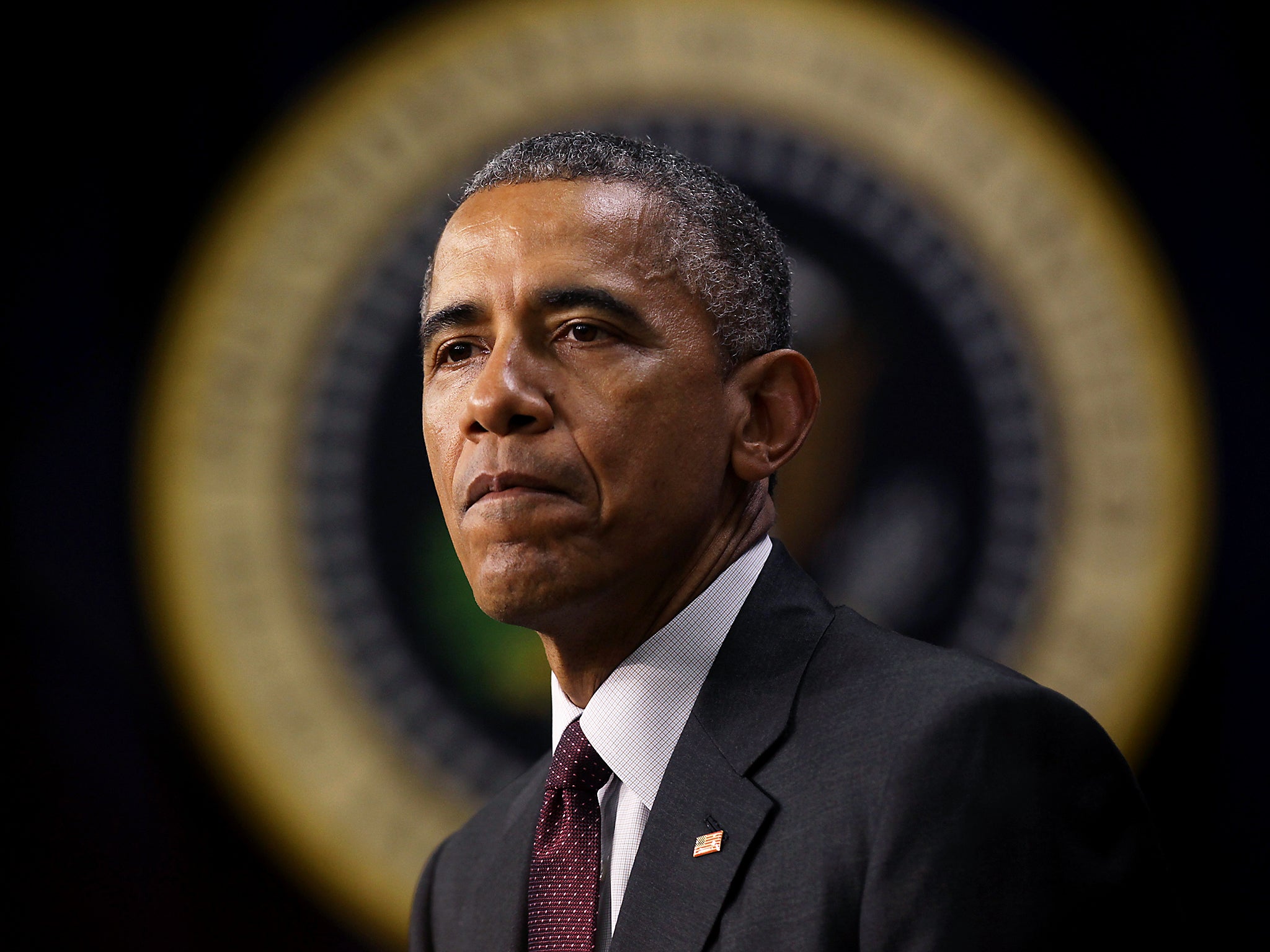Barack Obama's legacy: America feels a better place than eight years ago - and that alone is no mean feat
Reputations of presidents usually improve with time and Obama’s is unlikely to be an exception
That 500-watt lightbulb of a grin is as overpowering as ever. But the hair is thinner now and grey. His face is more gaunt, etched by lines invisible eight years ago. As usual, the American presidency has proved itself the greatest accelerator of the ageing process yet devised by humankind.
But these are mere details. This is the time of judgement for Barack Obama. The sands of his two terms at 1600 Pennsylvania Avenue have run almost through the glass. When he came to power, Barack Hussein Obama, black and with a name that brought to mind America’s bitterest enemies in the Middle East, was surely the most improbable president in US history – at least until the man Americans elected to follow him as their 45th. But where he will rate in terms of success or failure is far harder to discern.
One distorting agent has been the giddy expectations he aroused. In 2008, America and the world were mesmerised by a candidate who four years before had been a mere state senator from Illinois. The US might have been involved in two seemingly interminable wars and its global reputation in tatters, while the international economy was on the verge of collapse, but Obama was the embodiment of youth, hope and a new beginning.
Some at the time compared him to John Kennedy. But JFK had eked out the narrowest of victories of victories in 1960 over Richard Nixon. Obama that autumn swept all before him, not least his Republican opponent John McCain.

No-one could have lived up to the initial hype, capped by the quite absurd award of the Nobel Peace Prize after only nine months in the Oval Office, on the basis of a handful of rousing speeches. And Obama certainly has not. His own country is more divided and politically dysfunctional than when he took office. The world meanwhile has rarely felt so unstable, verging on chaos, as 60 years of Pax Americana are being replaced by an increasingly multipolar system, in which the US, still the mightiest military and economic power, on occasion seems hardly even to be primus inter pares.
It is a dispiriting legacy, but one largely not of his own making. From the outset Obama faced two massive headwinds: the worst economic and financial crisis since the 1930s; and unrelenting and unparalleled hostility from the Republican party. Oppositions are there to oppose. But surely no president deserved the scorched-earth enmity on Capitol Hill that has confronted Obama since Republicans regained control of Congress in 2010.
Not surprisingly, the most substantial legislation came early on. His administration’s swift economic action, in the shape of car and banking industry bail-outs, and an $800bn stimulus package, probably prevented a severe recession from turning into a second Great Depression. Recovery was buttressed by Wall Street and regulatory reforms designed to ensure nothing similar could happen again. The result has been almost eight years of growth, unspectacular by past standards, but more impressive than anything managed by most other established industrial economies.

And then of course there was healthcare reform – oddly, perhaps, since it had never been a prominent theme of his election campaign. Like everything else this president touched, Obamacare divided the country. It passed without a single Republican vote, and by year’s end it may well be expunged. But it was the greatest expansion of healthcare in the US since the passage of Medicare and Medicaid in 1965. Obamacare had flaws, as its authors admitted. Had Hillary Clinton won the White House those flaws would have been addressed. Now however the repeal process has already started. Even so, and however transient, Obamacare will have been a considerable achievement – not least for the 20 million Americans who obtained health coverage for the first time.
After 2010, with Congressional majorities arrayed against him, the 44th President was forced to turn to executive orders to pursue his goals of immigration reform, environmental protection and combating climate change. Many of these orders will be reversed by the incoming administration.

In 2012 Obama retained enough magnetism to win re-election by a decent margin. However he could never imbue his party with that magnetism. Over his eight years, the Democrats lost 12 Senate seats and 69 in the House of Representatives. After the 2016 election they retained unified control (occupancy of the governor’s mansion and possession of a legislative majority) in just five states, compared to 32 for the Republicans. Obama was never really a party man, and it showed.
He never seemed to enjoy the transactional side of politics. Schmoozing didn’t come easily either. "No drama Obama," he was once dubbed, and the description reflected what many saw as aloofness. America has rarely had a more cerebral president, one as detached and self-controlled. Above all he believed in reason – that the other side could not but see where its self interest lay.
Remoteness had its advantages. Obama had his own high standards and expected others to share them. Amazingly, not a single scandal tarred his eight years – no sexual dalliances, no instances of blatant cronyism, no dark plot by some federal agency to circumvent the law. To be sure, there were acts of incompetence: among them the botched roll-out of Obamacare, and the tragic 2012 attack on the US mission in Benghazi, Libya, upon which Republicans spent four years and millions of dollars of taxpayers’ money trying to smear Hillary Clinton, his Secretary of State at the time. But nothing stuck. As president, Obama was a class act.
But in the foreign policy field too, where a US president has the greatest sway, such virtues could on occasion be counterproductive. Obama took office vowing to end America’s involvement in Iraq and Afghanistan. In neither case did he truly succeed. In both, combat troops were pulled out only to return, sometimes in the guise of special forces, as radicals and terrorists groups filled the vacuum left by departing American and Nato soldiers.
He read the national mood correctly, that Americans, long ago soured on Iraq and Afghanistan, would not tolerate another “boots on the ground” war in the Middle East. He preferred drones and special forces operations (as the 2011 raid to kill Osama bin Laden in his hideout in Pakistan, in what would be his most unequivocal foreign policy success.)
Far more controversial was his inaction in Syria, the country that by the end of his presidency, amid the slaughter of Aleppo, had turned into a metaphor for all that was wrong with Obama’s laid-back and unbendingly rationalist approach to the world.
The watershed moment was in 2013, when Obama ignored the "red line" he had set against the use of chemical weapons by the Assad regime against its own population. Would firm action then – say the take-out of Assad’s airforce, or the establishment of safe zones, have prevented the subsequent horrors? Perhaps not, given the failure of coherent Syrian opposition to emerge.
But unwittingly, a signal had been sent. Obama the rationalist had decided the US could no longer be the world’s policeman – and indeed no president has placed more or a priority on multilateral action, none has relied less on the "my way or the highway" approach to international affairs.
For allies and enemies alike however, in the Middle East and beyond, from Riyadh and Cairo to the Kremlin, a suspicion took hold. Obama’s America was soft, a paper tiger that would not follow through on either its threats or commitments. Obama’s enduring global popularity has coincided with a decline in American prestige, or at least in perceptions of its power. The two trends are surely not unrelated.
At times he gave the impression of wishing the entire Middle East could somehow simply vanish (including Israel and its Prime Minister Benjamin Netanyahu, with whom US relations had hit an all-time low by late 2016). He talked of a "pivot to Asia," to focus on dynamic powers of the future like South Korea, Japan and of course China. But, constantly, the Middle East dragged him back – and not least Iran.
The outcome of the nuclear deal of 2015 with Tehran may prove the ultimate judgement on the Obama approach: was it an act of reasoned statesmanship that removed a nuclear threat and unlocked the path to a reordered, more stable Middle East? Or was it simple naivete, allowing an arrangement that merely strengthened an incorrigible foe and at best kicked the nuclear moment of truth a year or two down the road? Iran could prove Obama’s greatest foreign policy triumph, or his greatest foreign policy failure
So how will he be remembered, and what will be his legacy? Much obviously depends on the vigour with which a Republican White House and Congress take their wrecking ball to Obamacare, to the 2010 financial regulations and the various environmental regulations.

But even if the obliteration of these latter is near total, Obama will go down as a great environmental president, not just for his fight against climate change, but for expanding protection of America’s national parks and other natural assets. He may not have managed to push through immigration or criminal justice reform, but he has also been an important promoter of social change, most notably in gay and minority rights. Even if Obamacare disappears, its fleeting life has surely have strengthened the notion that guaranteed health coverage is a right, not a privilege. It is a change Republicans will ignore at their peril.
Obviously, Obama has not solved race relations in America. Indeed, race is a more divisive issue now than when he took office in 2009, thanks in part to the very fact that an African-American has been president. But thanks to his speeches on the issue, and his frankness in confronting the problem, Obama has got Americans talking more honestly about the problem, an essential prerequisite for progress.
The reputations of presidents tend to improve with time, and Obama’s is unlikely to be an exception. He has bequeathed his successor a solid economy. He has not solved the problems of a polarised America or an unstable world – but then again, who could have? But he did give the presidency an injection of grace and style unmatched since JFK. Most fundamentally, America just feels a better place than it was eight years ago. And that alone is no mean legacy.
Join our commenting forum
Join thought-provoking conversations, follow other Independent readers and see their replies
Comments
Bookmark popover
Removed from bookmarks